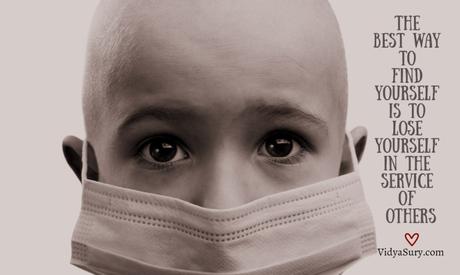
On 21 February 2018, I attended a press conference with a difference where India's first cashless hospital was launched by a self-funded NGO to fight cancer.
It was a unique event where Bangalore-based entrepreneurs Vijay Tata and Amrita Tata celebrated their daughter's birthday by pledging 50 acres of land worth Rs.100 Crores and an additional Rs.100 Crores towards the development of "SAACI" Saanchi Advanced Cancer Care Institute, India's first cashless cancer care hospital for the underprivileged. Bollywood actor Emraan Hashmi was present to launch the initiative.
The fight against cancer
The C word-Cancer-always brings fear. It is a disease in which abnormal cells divide uncontrollably and destroy body tissue. There are more than 200 types of cancer. Nobody is immune to it. When detected early, treatment can be effective, but expensive. But if detected later, the costs can kill the patient faster than the disease.
So, there are actually two dreaded "C"s when it comes to cancer: cancer itself and the costs.Every individual has the basic right to health and hygiene, which are necessities rather than luxuries. However, because of poverty and inequality, healthcare and hygiene have become the privilege of a few.
Thanks to India's massive population, it is a nightmare to be both poor and sick! Those that suffer the most are the ones who cannot afford quality care.
As it is, India's healthcare sector is already groaning from being overcrowded with patients, understaffed, failing equipment, and substandard hygiene.
It is much worse in the rural areas. When a primary healthcare center in a village is unable to sustain a patient's life, the patient is sent to a university hospital in the region. When the university hospital, already overworked, can no longer manage, emergency care patients are sent to larger urban hospitals. By the time they reach this point, their hope is threadbare and so are their resources. They are denied treatment because they can't afford it.
The cost of cancer treatment
While cancer can be treated, treatment is not accessible to everyone. A single sitting of chemotherapy costs about INR 90,000, with a full-fledged cancer treatment running into lakhs of rupees.
For instance, incessant coughing drove a Bangalore based patient to get himself tested. When the reports came, he was diagnosed with non-Hodgkin's lymphoma, a cancer that predominantly affects the lymph nodes and thereby the immune system. After two months and four chemotherapy cycles later, he had already spent Rs.5 lakh. The final bill is expected to be around Rs.10 lakh which will include the cost of a lymph node biopsy, a bone marrow test, an endoscopy, a PET scan, special anticancer drugs and six cycles of chemotherapy. Of course, savings have been encashed, bonds broken, credit cards maxed out.
Why is cancer treatment so expensive?
Sadly, the primary reason for cancer treatment costs is the cost of setting up a cancer hospital. Doctors estimate the investment in a 100-bed cancer specialty hospital of up to Rs. 100 crore, excluding the cost of land in most cases. Then there is the imported equipment that costs a fortune. Apart from equipment, cancer treatment medicines are expensive. Such is the reality of this disease and its cure, it becomes an imperative that we find a way to ensure that cancer doesn't wipe out a patient's life but also their entire ecosystem and family life.
Cancer is a curse that preys on the patient as well as the family, their ability to earn, their saving, their lives. It pushes people into the abyss of unending poverty. While the curse spreads we are not prepared to fight it, because of inadequate infrastructure, low awareness, high costs, and other reasons.
Any form of cancer drains the family's resources. Over 45 per cent of families with one cancer patient face catastrophic expenditures and 25 per cent are pushed below the poverty line (BPL). This is alarming. The Indian government's National Cancer Control Program, estimates that there are between 2 and 2.5 million cancer patients in the country at any given point of time.
What if cancer is detected late or if screening hasn't been done properly or treatment is not right?
- It could cost as low as Rs 2.5 lakh for six months of treatment, with some of the lowest priced generic drugs in the world
- It can be as high as Rs 20 lakh, with novel drugs and targeted medicines.
Sadly, with Cancer, the cost kills the individual faster than the disease.
Neither the government nor insurance-sponsored healthcare is making an impact in this situation. Nearly 39 million Indians are pushed into poverty by all sorts of healthcare costs.
In this scenario, it is truly heartwarming to see hope in the form of compassionate philanthropists working actively towards ringing in a change.
Vijay Tata donates 200 crore to launch India's first cashless hospital
What a memorable way to celebrate their daughter's birthday! I found it heart-warming. As someone who donates her blog earnings to welfare homes and underprivileged children, I am always looking for positive news of people who are generous enough to use their wealth to make a difference in lives.
During the press conference, Mr. Vijay spoke at length about how the idea came about and then, announced the launch of their dream project "New India Charitable Trust", their self-funded NGO, through which they are gifting Rs 200 crores towards building a cashless cancer care hospital for the underprivileged.
What is fascinating about this project is:
- They will not accept donations.
- The non-profit organization will focus on creating hope for bettering the lives of the poor.
- It will cater to women, children, critical illness and "Stop Rape" initiatives to bring justice and reconstruct their lives.
- Those who cannot afford cancer treatment will be treated completely free of charge in this cashless hospital that will have NO billing counters. Quite a novel, first-of-its-kind initiative.
The entrepreneurial couple has been sheltering 40 kids for 6 years and now, they've expanded their dream to give back to society in a bigger way, hence New India. This is inspired by the Prime Minister's vision for healthcare. The immediate goal is to improve the life of those below the poverty line, giving them access to timely treatment, free of cost. The first phase of the 150-bed hospital is expected to be ready by December 2018. It will be state-of-the-art, with the latest facilities and renowned oncologists, with the goal of providing holistic care for cancer patients, including free treatment and after care.
While they have no plans to accept donations, they certainly need mass support to make their venture a success. For more information, please visit the New India website. New India, is a self-funded NGO committed to women empowerment, betterment of underprivileged children and quality healthcare in India. New India aims at making India Invincible.


